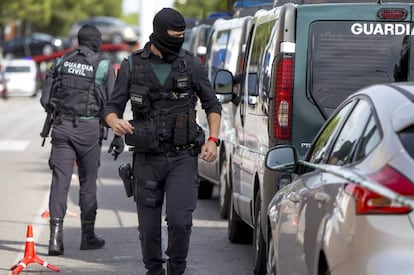‘Sextortion’ ring that blackmailed men seeking prostitutes may have claimed 4,000 victims
According to court documents, the criminals threatened to expose individuals across Spain for having contacted sex workers if they refused to pay out large sums of money

The number of victims of a “sextortion” network the Civil Guard took down in February last year is close to 4,000. That’s according to a court document sent by Judge Jerónimo Cano to the Supreme Court, in which he suggests that Spain’s High Court, the Audiencia Nacional, oversee the case given the elevated number of victims and its wide reach across “practically all of the national territory.”
The criminal group told victims they would send the mafia to kill them if they didn’t pay
Around 30 people are accused of being involved in this particular network, including Toño García, a player for the Valencian soccer team Levante UD. The two suspected ringleaders – Ismael Bousnina, alias Salva, and Massinissa Ferrah, alias Erik – have been in a prison in the eastern Teruel province since their arrest in February 2018. They are under investigation for extortion, threats, crimes against privacy, document forgery, misappropriation, money laundering and organized crime.
Sextortion is a form of blackmail in which sexual information or images are used to extort favors from a victim against their will. In one of the first reports included in the case, the Civil Guard described the network as an “organized criminal group” aimed at blackmailing people who had contracted, or tried to contract, the services of prostitutes via the website pasion.com. According to the police report, the network could have been operating “for years,” leaving behind “hundreds or thousands of victims.”
The Civil Guard argued that the suspects “compulsively and predatorily extorted victims, who – fearing that their family or partners would find out that they were regularly or sporadically using sexual services – made payments of different amounts on one or more occasions.” The criminal group told victims they would send alleged members of an Eastern European mafia group to beat them up or kill them if they didn’t pay. “I want my money in half and hour and if I don’t get it, I will shoot you twice in the leg,” they told a man if he didn’t hand over €450.
‘Mules’ to receive money
According to various Civil Guard reports, the fear of being killed or hurt “paralyzed victims and led them to pay the money requested, which in some cases, was more than several thousands of euros.” One victim handed over €25,000. By the time the first arrests were made, investigators said the network had made “hundreds of thousands of euros.”
To collect these payments, the suspected blackmailers set up a network of accounts using front-men so that the blackmail could not be traced back to them. Working with a family from La Coma, a crime hotspot in Valencia, the network coordinated a group of so-called “mules,” who allowed their bank accounts to be used by the blackmailers in exchange for a small commission. For every €1,000 paid, €50 went to the coordinator and €50 to the mule. The money was immediately withdrawn from the accounts, most of the time using a code to avoid leaving any trace of a card. One of the individuals accused moved more than €250,000 “in just a few months” – €233,000 of which went directly into accounts opened by people with passports from the Republic of Malawi, a landlocked country in southeast Africa. Police suspect these passports were fake .
I want my money in half and hour and if I don’t get it, I will shoot you twice in the leg
Alleged blackmailer
The Civil Guard became aware of the network in April 2018, when one of the victims filed a police report at a station in the Teruel municipality of Sarrión after they continued to be extorted despite paying the blackmailers. “There will be consequences and your family will find out,” the person was told. In the following months, another six residents from Teruel reported similar crimes. The investigation soon spread to the provinces of Navarre, Castellón and Gipuzkoa, where another nine victims were found. Early investigations pointed to Valencia province as the site of the sextortion network, given that that the bank accounts that collected the blackmail money were listed there. Ten months later, officers arrested Bousnina and Ferrah, both from Valencia.
Last year, Judge Cano tried to hand the case over to the High Court due to the “magnitude” of the investigation, but his request was denied on the basis that the network did not operate throughout Spain. In response, Judge Cano asked the Supreme Court to decide in which court the case should be heard.
English version by Melissa Kitson.
Tu suscripción se está usando en otro dispositivo
¿Quieres añadir otro usuario a tu suscripción?
Si continúas leyendo en este dispositivo, no se podrá leer en el otro.
FlechaTu suscripción se está usando en otro dispositivo y solo puedes acceder a EL PAÍS desde un dispositivo a la vez.
Si quieres compartir tu cuenta, cambia tu suscripción a la modalidad Premium, así podrás añadir otro usuario. Cada uno accederá con su propia cuenta de email, lo que os permitirá personalizar vuestra experiencia en EL PAÍS.
¿Tienes una suscripción de empresa? Accede aquí para contratar más cuentas.
En el caso de no saber quién está usando tu cuenta, te recomendamos cambiar tu contraseña aquí.
Si decides continuar compartiendo tu cuenta, este mensaje se mostrará en tu dispositivo y en el de la otra persona que está usando tu cuenta de forma indefinida, afectando a tu experiencia de lectura. Puedes consultar aquí los términos y condiciones de la suscripción digital.








































